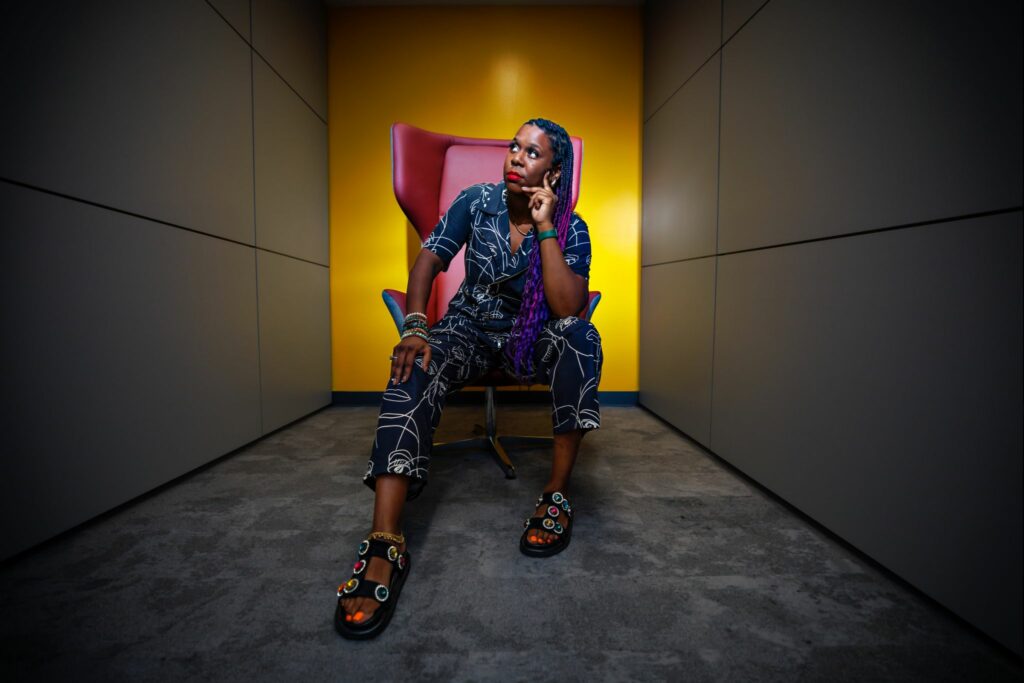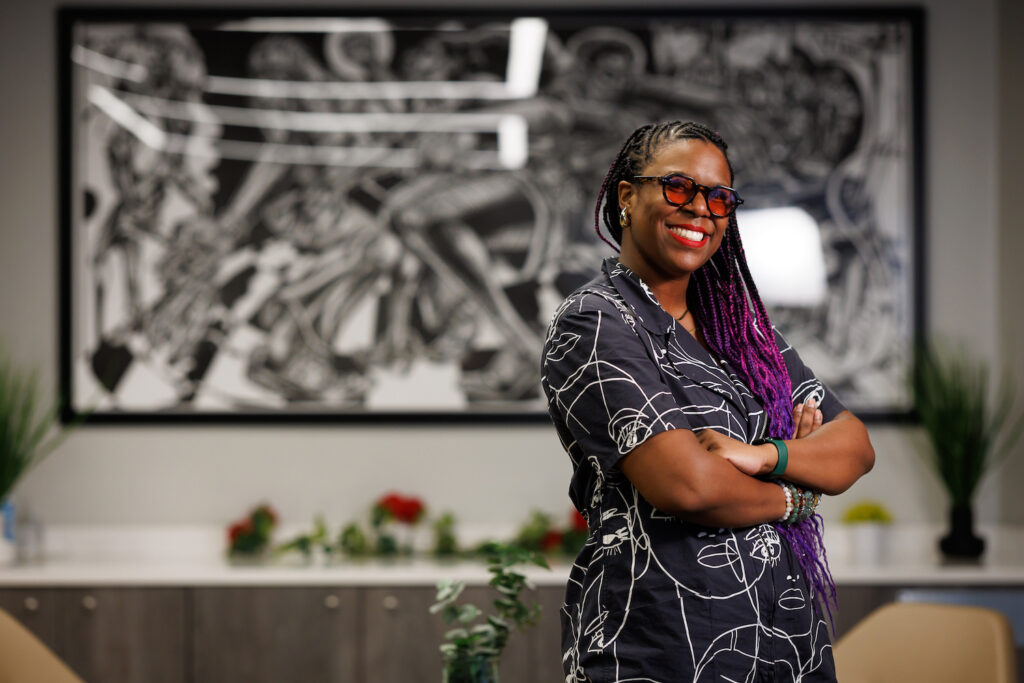Harriett Williams should have been worried.
As the holiday season approached in 2016, the freshly minted homeowner — with a new car to boot — was working through her fourth year as a forensic technology associate for KPMG in Atlanta. Responsible for data collection in client investigations (“cool things I can’t talk about,” she says), Williams navigated the ins and outs of corporate leadership and professionalism when suddenly confronted with an unfortunate business reality: downsizing.
“I watched all the ‘Game of Thrones’ and Netflix that I possibly could — it was the holiday time, and nobody was hiring,” she says with a quiet laugh. “So one day I decided I was going to get out of the house and volunteer in my community — I’m going to help somebody because I have to do something.”
Using the insights she sharpened at KPMG and the Terry College as a management information systems major, Williams sought to enrich a local business in her Westview neighborhood, located in southwest Atlanta. It was novel, different and comforting — everything up to this point built her for the corporate world, but she was discovering you can live life and not be incorporated.
It set her on an entrepreneurial path — a route she trekked in her youth — and into a consulting business creating roadmaps to financial success for startups and small businesses. Williams never thought she’d leave KPMG, but past experiences steeled her for the abrupt layoff. There was never cause for concern.
“My life is God’s will,” she says. “I have a lot of ideas of where I think I want to be, and God’s like, ‘Absolutely not. We’re actually doing this.’”
The present “this” is the Village Micro Fund, a grassroots finance group providing capital, education and support for emerging entrepreneurs in the Black community. Williams co-founded the fund with Donte Miller and Nathan Jones, merging her boutique consulting firm The Tubman Group into the duo’s emerging fund in 2018. The trio’s shared synergy centered on creating a path of wealth for future generations deprived to their ancestors.
“We often say in the Village that there’s not a lack of genius in our communities, there’s a lack of opportunity,” she says.
And that’s where the Village Micro Fund steps in. Benefiting from solid business education training, the trio developed a free curriculum for entrepreneurs to track their progress while offering two 15-week cohorts a year teaching business model development, pitching tips, accounting, public speaking and process management to small business owners. Each cohort receives big business sponsorship, and this cohort’s sponsor — Walmart — will award a $25,000 prize to the entrepreneur with the best pitch at the end of the 15 weeks.
Partnerships were built with the aptly named Access to Capital for Entrepreneurs (ACE), the Atlanta Wealth Building Initiative (which reimagines economic realities in communities of color), and Kiva, a company helping underserved communities receive crowdfunded loans. Village has plans to become a Community Development Financial Institution and provide credit and financial services to underserved markets. To expand its borders, the fund embraced cryptocurrency while taking advantage of trade and treaty agreements to spur international expansion for its clients. Whatever innovation or solution is needed, Village Micro Fund is on the task.
“A lot of entrepreneurs of color have to piecemeal their businesses together,” she says. “My dream for every business that resonates with us is that they can walk into their building because they’ve been able to get funding that is flexible and affordable and see their vision actualized that first day. I want that for all of our businesses.”

Village has proven indispensable for the businesses it helped, especially during the global pandemic. The fund distributed $1.8 million to small businesses affected by COVID-19, allowing them to keep afloat while offering consulting and technical aid.
Just Add Honey Team Company is a shining example. Nestled on Atlanta’s Beltline, the business came to the fund with the prescient idea in 2019 to get into online sales, and with Village’s help, updated its website and developed a concept for parTEA in a box — a take-home version of its signature afternoon tea experience.
“During the pandemic, you could send these boxes to your family members and go on Zoom and have a virtual party,” Williams says. “They said Village was able to help them conceptualize and lead them to a safe place so when COVID happened, they were ready to act.” With exponential online sales, Just Add Honey was able to expand its business and “work on their business, and not just in it,” she says. “It propels and prepares you in ways you don’t even know.”
While her work is a steady drive to promote others, Williams understands her need for self-care. And though your idea of self-care may include an afternoon mocha (with whipped cream? Yes) or perhaps a mani on a busy Monday morning, Williams’ involves building a fashion line of avant-garde, one-of-a-kind, wearable, collectible art.
She enrolled in Le Fashion Lab, an Atlanta institution “disrupting fashion education,” to fully learn what it means to be in the fashion world as she promotes Dirty Harriet, a clothing brand she created with visual artist Fabian Williams. In high school — when the classically trained pianist wasn’t making money playing for her Augusta church — she built costume designs, a skill she became interested in after watching “Project Runway.” But while she was a lover of all the arts (she was also a ballerina), her practical parents steered her toward a career in math, business and science.
“And I did that,” she says. “I did it my mom’s way, and now it’s time to do it my way. Being an entrepreneur has allowed me to step back and do everything I ever wanted to do. … Learning at Le Fashion Lab has been the most rewarding thing — it goes back to my experiences of what I’m doing today and then being very intentional. I think about 8-year-old me, and that’s why I’m doing this. I’m doing this for 8-year-old me.”
She doesn’t do all the things she does for accolades, but she has plenty of them. Williams is on UGA’s 2023 40 Under 40, and the Village Micro Fund was No. 14 on the 2023 Bulldog 100 list of fastest-growing businesses owned or run by UGA alumni. Last year, the Village Micro Fund was named a Beloved Community Beacon, given to those who provide economic support to the people of Atlanta. She also received the Good Trouble Award, named in honor of the late Congressman and civil rights leader John Lewis, and given to founders in Atlanta who committed their lives to public service and community-centered problem-solving.
You never know where you go in life, even if you think it’s all planned out. At distinct points, Williams had ideas of what her life would be, but time and experience taught her that creating legacy — “one of the things that fuels me” — is about hard work, sacrifice and taking chances.
“One of the most impactful quotes that changed my life is, ‘What’s for me won’t miss me,’” she says. “And that’s beautiful because a lot of times we deal with rejection or being redirected differently, but you have to be flexible and realize maybe there’s something over here that I need to look at. Maybe I’m being redirected into a different playing field because that wasn’t what I was supposed to do. So let’s explore.”

